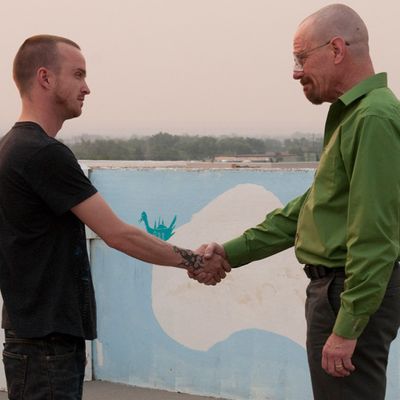
Good guy, bad guy, family man, hit man, teacher, junkie, mogul, peon. Among other things, Breaking Bad is a show about roles and how hard it is and then suddenly how easy it is to be someone else. For a show thatÔÇÖs so much about power structures, responsibility, and consequences, though, thereÔÇÖs a hole in Breaking BadÔÇÖs social fabric: The showÔÇÖs technically about a father, one who got involved in the drug trade in the first place to provide for his family, but we sure donÔÇÖt see a lot of fathering going on. All the instances of real fatherhood are polluted, all the guidance warped. Breaking Bad doesnÔÇÖt have a dad.
It should be Walt. But like so many Maury Povich guests, Walt is not the father. He barely parents his actual children, and the moments where it seems like heÔÇÖs parenting Jesse (their relationship constitutes the real father/son dynamic on the show) are fraudulent. On this past SundayÔÇÖs episode, a concerned Walt rubbed JesseÔÇÖs shoulderÔÇÖs as the┬áprot├®g├® sobbed hysterically. Walt was soothing and patient, so very paternal as he calmed his panicky sidekick. Except the situation was a lie, and Walt had orchestrated every single piece of emotional anguish that befell Jesse. That doesnÔÇÖt count as help. Whatever fathers are supposed to do for the children, and maybe for their sons in particular, is not what Walt has done for Jesse. Jesse was better off when Mr. White was just his chemistry teacher, because when that person said ÔÇ£apply yourself,ÔÇØ it was so Jesse could learn something. Now when Walt wants Jesse to apply himself, itÔÇÖs so Walt can have something.
There are, of course, the actual father/child relationships on the show. Like that of Walt and Walt Jr. The most important episode in their relationship is ÔÇ£Salud.ÔÇØ In it, a badly beaten Walt misses his sonÔÇÖs 16th birthday. Walt Jr. shows up at his fatherÔÇÖs house, only to have his dad breakdown sobbing and apologize. Catharsis time! Except that, in his addled state, Walt calls his son Jesse. That apology wasnÔÇÖt for Walt Jr. Later in the episode, a more clearheaded Walt tries to explain to his son that he doesnÔÇÖt want to be seen in this decrepit state. Walt explains watching his own father die, slowly and in agony, until his fatherÔÇÖs breath sounded like ÔÇ£shaking an empty spray paint can.ÔÇØ ItÔÇÖs a haunting scene, maybe even a beautiful one, but itÔÇÖs not a scene about Walt being a father. ItÔÇÖs a glorified flashback. ItÔÇÖs a scene about Walt being a son losing his own dad.
In ÔÇ£Phoenix,ÔÇØ Walt holds his infant daughter in one arm as he peels back insulation with the other, revealing stacks upon stacks of cash, piled up inside the walls of their house. ÔÇ£See what your daddy did for you?ÔÇØ he coos. Walt didnÔÇÖt do this for her, at least not all of it, no matter what he claims in that weird tender moment. He did it because he likes it. ÔÇ£You get used to it,ÔÇØ he told Skyler on last weekÔÇÖs episode; the guilt, the doubt, the fear. Boy, did he. Holly will only ever know her father as The One Who Knocks. That might mean heÔÇÖll die before sheÔÇÖs old enough to remember him, or it might mean sheÔÇÖll only know him when he was scary and dark and brave, unlike her brother, who knew him when he was sick and small, too.
The rest of the dads on the show donÔÇÖt fare much better than Walt does. JaneÔÇÖs father tried valiantly to help her, but he couldnÔÇÖt save her from heroin or from Jesse or from Walt, and his grief caused the deaths of dozens of people. Jesse and his father donÔÇÖt get along, so much so that Jesse bought his childhood home just to spite his folks. Ted speaks vaguely of his children. We know Mike only as a grandfather, not as a father. (And actor Jonathan Banks suggests MikeÔÇÖs relationship with his unseen son is what lead him down such a ÔÇ£dark path.ÔÇØ) Jesse tries to be a father figure to Brock, but the child end ups almost dead thanks to Walt poisoning him, maybe the least fatherly act imaginable.
Instead of dads, we see uncles and cousins and brothers. The real father figure in Walt Jr.ÔÇÖs life is his Uncle Hank, whom he worships and who seems to adore him right back. The head of the Salamanca family isnÔÇÖt a father, itÔÇÖs a tio, and GusÔÇÖs chicken chain isnÔÇÖt Los Pollos Padres. The guys who come after Hank are cousins.
Breaking BadÔÇÖs characters live in a world of decay, their lives rotting and sinking right around them. (At least thatÔÇÖs what Vince Gilligan says.) The show tells stories about the disrepair we wreak on each other, about the times we lose balance and find chaos instead. Times when you might really need your dad.

